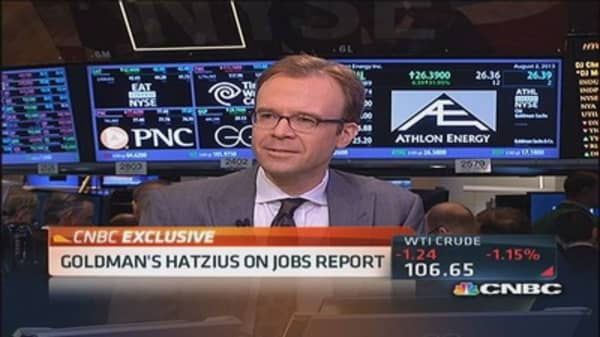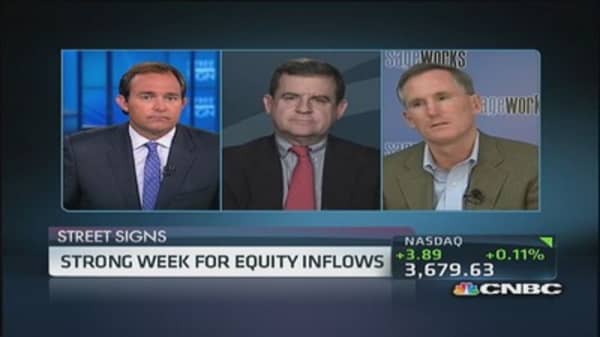Stocks closed modestly higher in thin volume on Friday despite a tepid jobs report. While the data was disappointing, it still showed job growth and may also make the Federal Reserve a bit more hesitant about curtailing its bond purchases in September.
The U.S. economy created just 162,000 nonfarm payroll jobs in July after a downwardly revised 188,000 in June. The unemployment rate fell to 7.4 percent.
The quality of the jobs being created is also an issue. Burt White of LPL Financial pointed out, "Over the last four months we've created 4.2 part-time jobs for every one full-time job. That trend is not going in a good direction."
After spending the session clawing back morning losses, the Dow Jones Industrial Average, S&P 500 and Nasdaq ended with slight gains. Both the S&P and Dow set new closing highs.
The CBOE Volatility Index (VIX), widely considered the best gauge of fear in the market, fell to 12.1.
Among S&P sectors, consumer discretionary and materials stocks led the gainers. Energy fell after disappointing earnings from oil giant Chevron.
After hitting new highs the markets can still advance. "I think the market grinds higher," Bob Doll, chief equity strategist at Nuveen Asset Management, said. "We're not going to go up another 18 percent as we have since the first of the year in my opinion. But I think the market ends higher than where it is today."
Fed tapering in September?
The jobs data may push back the timing, or at least scale, of a potential Fed taper.
St. Louis Fed president James Bullard said in a speech Friday that the central bank "needs to see more data" before it makes a decision about slowing the pace of its $85 billion-a-month bond-buying program.
(Read more: So-so summer: Job growth disappoints; rate drops)
Some economists, meanwhile, see just a small reduction in bond purchases next month.
"I think they'll only do $15 billion because the evidence will be still somewhat ambiguous," BNY Mellon economist Richard Hoey told CNBC of the potential cutback in bond purchases. "I don't think they'll do $25 billion. That's too strong a measure."
In other data, U.S. consumer spending increased 0.5 percent in June, lifted by automobile purchases and higher gasoline prices. Personal incomes rose 0.3 percent. June factory orders, meanwhile, rose 1.5 percent after an upwardly revised 3 percent in May.
(Read more: Escape velocity hopes give way to law of gravity)
Cable stocks jump
Cable stocks rose on reports that Cox Communications and Charter Communications held merger talks. Cablevision was up sharply as well.
Turning to earnings, oil giant Chevron posted a 26 percent decline in net income due to lower oil prices and maintenance work at its U.S. refineries.
Viacom, meanwhile, reported a 14 percent rise in revenue helped by strong advertising and affiliate fees at its cable networks. The media giant also doubled its stock buyback program to $20 billion.
LinkedIn shares surged following better-than-expected earnings and after a number of brokers hiked their price targets on the social networking firm.
Facebook also closed above its $38 IPO price for the first time.
AIG stock rose after the company posted strong earnings and said it would return capital to shareholders.
In other news, Dell's special committee and the buyout group led by Michael Dell reached an agreement that would help clear passage of the deal. The deal calls for $13.75 per share and a special dividend of 13 cents per share. Investor Carl Icahn, who has proposed a rival bid, said the move is not enough. "We are not satisfied – we believe that an increase of a mere 13 cents is an insult to shareholders," he said in a press release.
— By CNBC's Justin Menza. Follow him on Twitter @JustinMenza.





